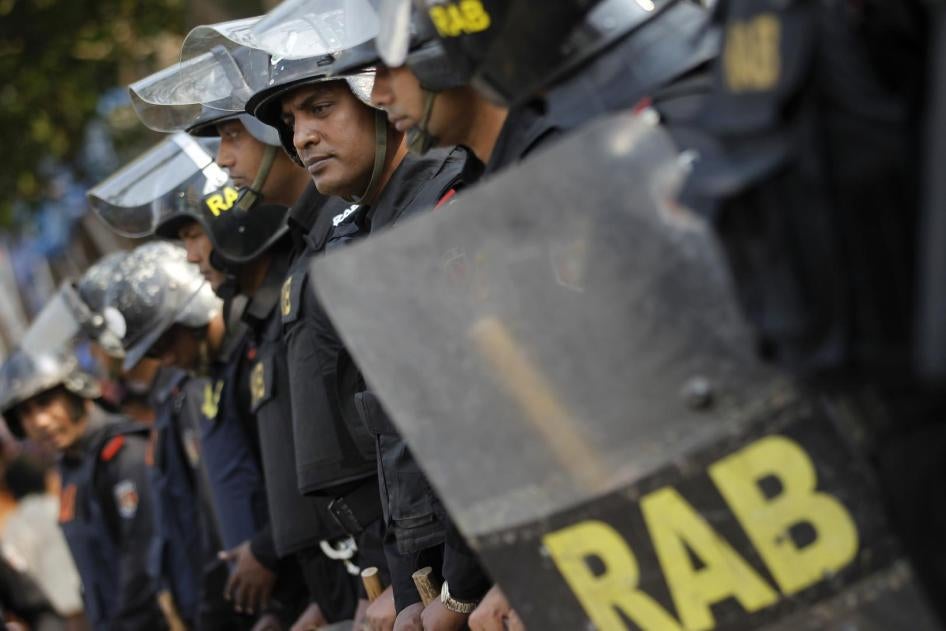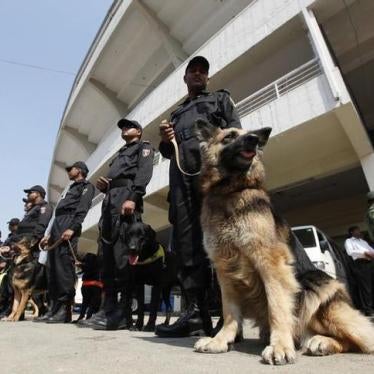Years ago, I met with Shamsunnahar Alam in Bangladesh, whose 24-year-old brother had been shot by the Rapid Action Battalion (RAB).
According to a statement from RAB, on September 9, 2009, after receiving information that a criminal called Kamrul Islam, better known by his nickname Bappi, was in the area, RAB forces arrived to make an arrest. According to RAB, a gunfight initiated by the criminals ensued, and Bappi was killed.
In fact, RAB had instead killed Shamsunnahar Alam’s brother Kaisar Mahmud, who was also known as Bappi. Apparently, RAB forces asked his name, and when Mahmud said “Bappi,” they grabbed and killed him. “Witnesses heard my brother tell the officers, ‘Please don’t kill me. You are mistaking me for someone else. I am from a good family,’” Kaisar Mahmud’s sister told me. “They still shot him.”
Under pressure from the Dhaka-based human rights group Odhikar, the authorities finally ordered an investigation. It concluded that RAB officials had killed the wrong person because they acted “without verifying the truth of the information” and recommended prosecuting the perpetrators. But the government failed to act.
That is why the recent spate of the deaths in apparent gunfights with drug dealers and users in Bangladesh is raising concerns about the kinds of extrajudicial killings that have made RAB notorious.
Prime Minister Sheikh Hasina has said that there will be action if “any innocent person falls victim.” But she has said this before, promising a “zero tolerance” policy toward extrajudicial killings that has never been enforced. Instead, the security forces are given a free pass to determine guilt and hand out punishments.
Late last month, after Akramul Haque’s family released the audio recordings, the public reacted with outrage. “We are noticing that many people are being victimized of extrajudicial killing every day,” 10 eminent citizens said in a statement.
“It’s unimaginable in a democratic state and society. Such type of incident is enough to make the entire anti-drug drive questionable.” The National Human Rights Commission has called for an investigation.
Akramul Haque, a member of the Awami League and a ward councilor in Teknaf, had been receiving some odd calls for some time from people claiming to be members of military intelligence.
Family members told journalists that he set up an automatic recording program on all their phones as a precaution. On May 27, it produced chilling results.
His worried wife and children started calling his phone late that night after he failed to return from a meeting. The recordings that the family released suggest increasingly terrifying exchanges with him. And their last call was answered by someone other than Haque, and then there was the sound of gunshots.
After his body was recovered by the police, the family demanded an investigation saying that Haque had been killed in cold blood by security forces.
The authorities initially said Haque was a suspected drug dealer, and was killed in a gunfight with members of RAB during an ongoing crackdown against the illegal drug trade.
Bangladesh has a significant problem of addiction to recreational drugs, in particular a methamphetamine combination known locally as yaba, which has led to overdoses and reports of increased criminality. Since the crackdown started, the authorities say that millions of dollars of drugs have been seized and thousands of people have been arrested.
Instead of criminalizing possession and personal use of drugs as Bangladesh does, though, international experts recommend non-penal, regulatory, and public health approaches that do not violate human rights. Over 120 people have been killed in recent weeks since the crackdown started, most of them in RAB operations.
Many called for RAB to be disbanded after it was caught out all too often making false claims of deaths in armed exchanges, or what it calls “crossfire.” Instead, abusive practices have spread from RAB to other security forces, with the Detective Branch of police accused in numerous cases of secret detentions and enforced disappearances.
Following the outrage after Haque’s killing, while one minister said “one or two mistakes can happen,” the home minister said the government will investigate whether the recordings are accurate.
However, considering a history of impunity for human rights violations by security forces in Bangladesh, there is reason to doubt that any investigation will lead to proper prosecutions.
To ensure that there are no human rights violations during this crackdown on the illegal drug trade, the government should firmly address the culture of lawlessness and impunity by ensuring a proper and independent investigation of these recent deaths, including the killing of Akramul Haque.










